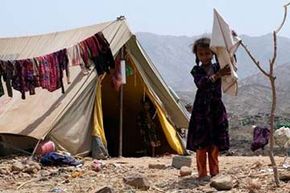If you live in a developed nation, the thought of not being able to findfoodat grocery stores is hard to imagine. Sure, you might not always have the money to buy the fare you desire, but the fact is, there's food available if you can afford it. In other parts of the world, however, it's a very different story.
In 2008, a severe food crisis rippled across the world, causing malnutrition and starvation from the Philippines to Haiti and from Egypt to Burkina Faso. But even as the overall situation improved, several ongoing localized food crises have continued to have an impact on specific regions. In Yemen, for example, workers with the United Nations' World Food Programme are scrambling to secure $75.3 million out of the $103 million needed to feed all the people starving in a war-torn region of the nation for the year [source:UN News].
Advertisement
As of May 2010, some 3.4 million Yemenis out of a total population of 23 million were threatened by an extreme lack of food. WFP workers were only able to provide half rations (1,050 calories per day) to a few hundred thousand of those refugees -- aid that will practically cease come August 2010 if the group can't secure additional funding. It's not surprising so many Yemenis are struggling -- less than 3 percent of the country is arable, and more than 45 percent of the population lives below the poverty line [source: CIA World Factbook]. So while we know many Yemeni are struggling to obtain food, will the situation get so bad that the rest of us will have to fight over it as well?
World hunger extends beyond Yemen. In 2010, the WFP's goal is to feed some 90 million people facing starvation in 74 countries around the globe. Logistically this is no easy task, and WFP workers use everything from ships, planes, helicopters and trucks to elephants, yaks, donkeys and camels to get food to people in need [source:WFP].
Advertisement



